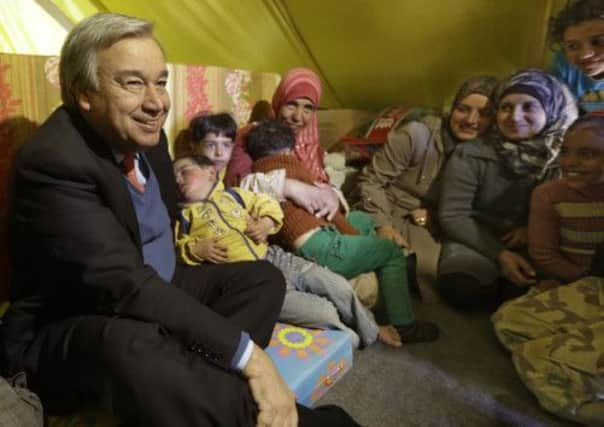Syrian refugee children face exploitation, misery


With the Syrian conflict in its third year, the 61-page report by the UN High Commissioner for Refugees (UNHCR) highlights the plight of the children, who are growing up in fractured families, missing out on education and increasingly going out to work to help support extended families in exile.
More than two million Syrians have fled their homes because of the country’s raging conflict, seeking shelter in neighbouring countries such as Jordan, Lebanon, Turkey and Iraq. At least half of the refugees – 1.1 million – are children. Of those, some 75 per cent are under the age of 12, the UNHCR report said.
Advertisement
Hide AdAdvertisement
Hide AdChildren as young as seven work long hours of manual labour in fields, farms and shops for little pay, sometimes under dangerous or exploitative conditions, the report added.
In Jordan’s sprawling Zaatari refugee camp, most of the 680 small shops employ children, the report pointed out.
A UNHCR assessment of refugee children living outside the camp found that in 11 of the country’s 12 provinces, nearly every second refugee household surveyed relied partly, or entirely, on income generated by a child.
In Lebanon, hundreds of refugee children – many of them girls aged seven to 12 – are picked up daily at dozens of informal refugee settlements dotting the Bekaa Valley and border areas in the north, loaded on to trucks and taken to the fields where they work for six to eight hours and earn up to 6,000 Lebanese pounds (£2.40) a day.
Many Syrian refugee children in Lebanon fall into the hands of criminal gangs specialised in exploiting the most vulnerable victims of the conflict. They are seen begging on the streets of Beirut or more frequently selling flowers and chewing gum for their often abusive patrons.
Lack of access to formal education is a persisting problem among refugee children, the UNHCR said, with its research showing that more Syrian refugee children are now out of school than enrolled in a formal education system.
In Jordan, more than half of all school-aged Syrian children are not in school. In Lebanon, some 200,000 Syrian refugee children may remain out of the system at the end of the year because local schools have run out of classroom space.
Sonia Zambakides, the director for Save the Children for Lebanon, said: “It’s another tragic consequence of the crisis. Young Syrian refugee children who should be in school are instead out working in the fields from early morning until late afternoon for a pittance.”
Advertisement
Hide AdAdvertisement
Hide AdThe charity is giving the most vulnerable families cash donations during the winter as part of a programme that provides parents with an alternative to sending their children out to work. It also supports thousands of children in various learning programmes and back-to-school campaigns in Lebanon so that thousands of children – many of whom have been out of school for more than two years – will be able to continue their education.
Another disturbing symptom of the crisis is the vast number of babies born in exile who do not have birth certificates, the UNHCR said.
The agency’s recent survey showed that in Lebanon 77 per cent of 781 refugee infants sampled did not have an official birth certificate. Between January and mid-October, only 68 certificates were issued to babies born in Zaatari camp, Jordan, the report said.